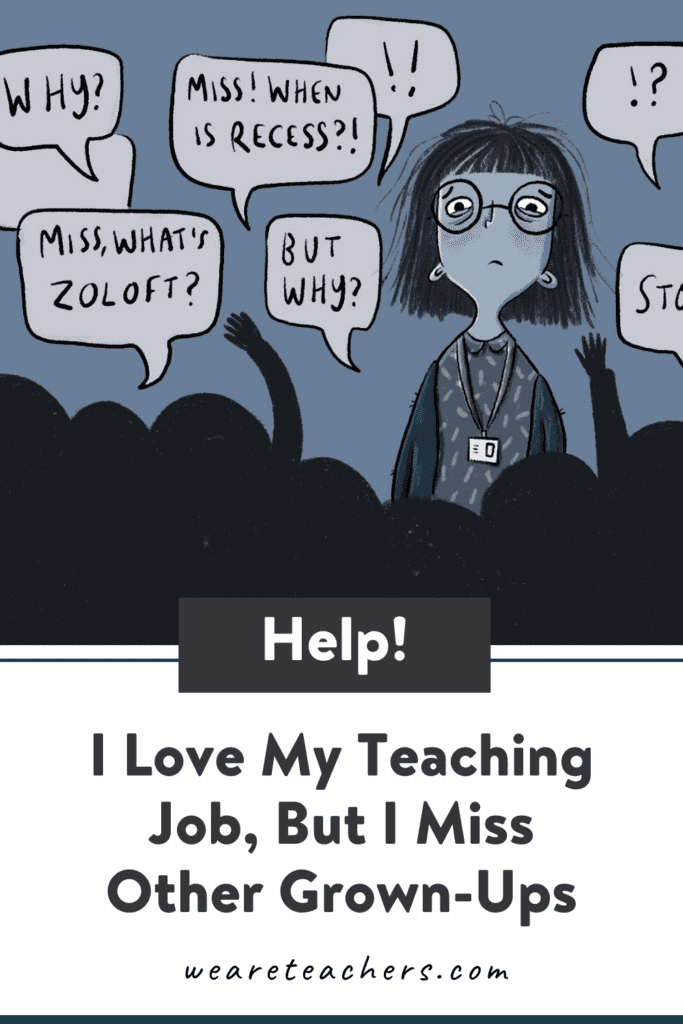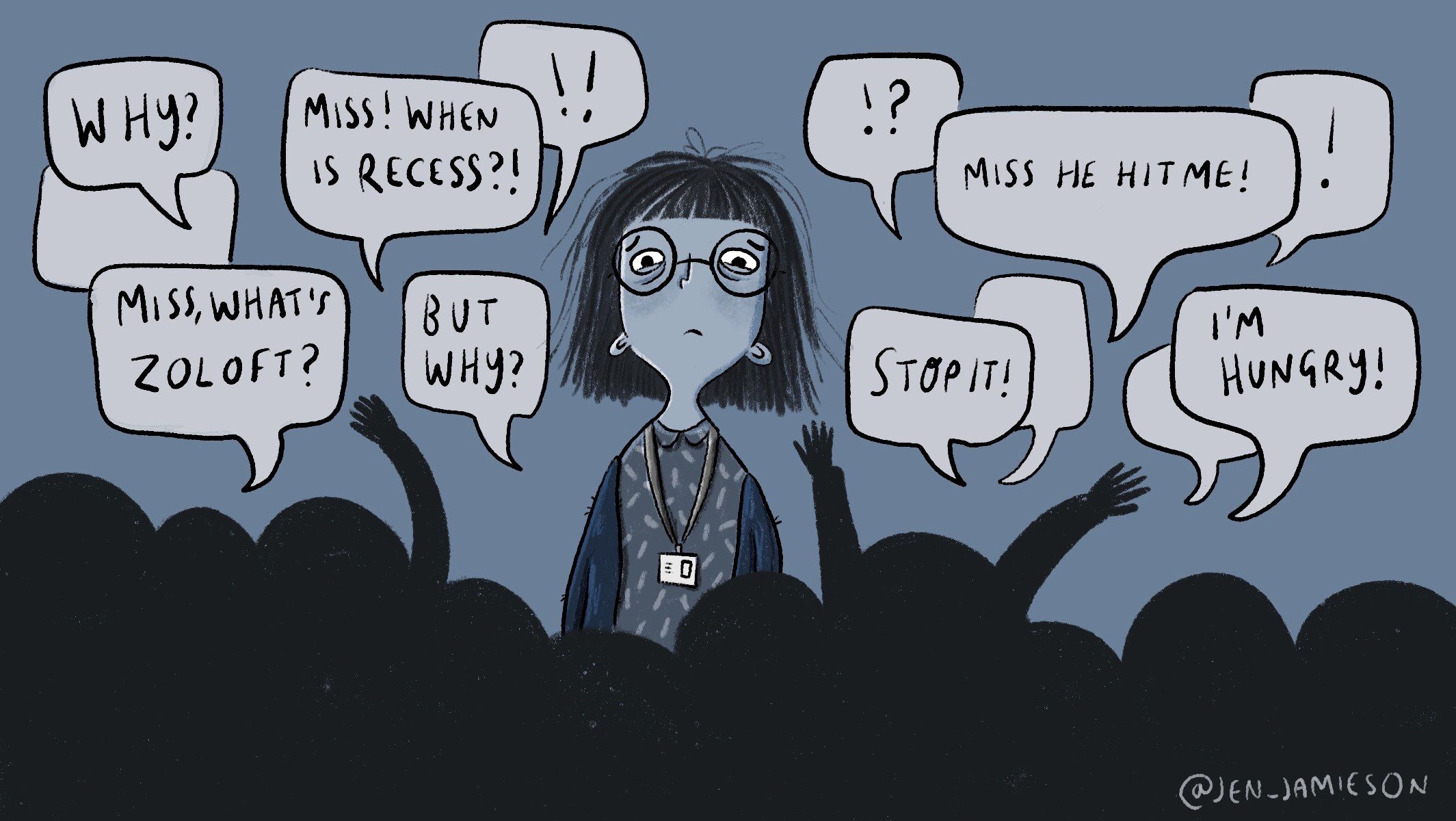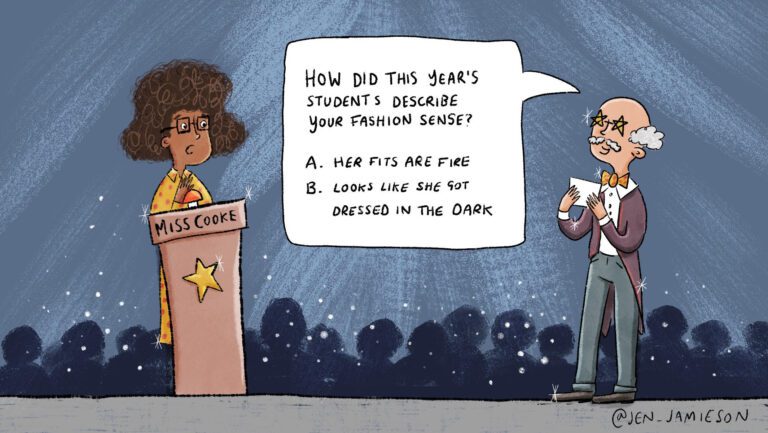Dear WeAreTeachers:
I have been REALLY struggling recently emotionally, so I talked to my therapist today. (Finally, after having to leave class this morning because I just started crying.) I’ve learned that I am really craving adult interaction. My days consist of almost constantly being with students at school and at church and alone much of the time at home. The highlight of my week is when I can spend time with other adults, and I NEVER thought of that before! Turns out I miss other grown-ups. So eye-opening! Because of this, I think I’m actually depressed. What suggestions do you have for overcoming this? —Craving Connection
Dear C.C.,
Thank you for bringing up how social connection is a basic need for every single one of us. I think we all melt into that feeling of extending and receiving presence, warmth, and care from another. And your recognition of missing connection with other grown-ups is a start to addressing the depressed feelings and episodes you have been experiencing.
We are in the thick of a persistent global pandemic where social distancing is the new norm. New research is helping us understand that social and physical pain are found in the same neural neighborhood. David Rock sums it up well in an article for Forbes: “So when you’re in significant pain, be it social or physical, you tend to experience the same harmful effects on performance and well-being. Given the global threats of mass quarantine, due to COVID-19, I’d submit that connectedness is just as important these days as—if not a close second to—oxygen, food, and water.”
And it’s not just COVID-related. Feeling isolated and missing adult interaction is a common feeling for teachers who spend their days in the classroom with kids. So you are not alone with those overwhelming feelings of sadness and loneliness. I do want to point out that it’s both inspiring and important that you are letting yourself feel these intense emotions. The more nuanced we are about our feelings and life circumstances, the more we understand ourselves. Our ability to do this is known as emotional granularity. “Research on ’emotional granularity’ or ‘differentiation’ supports the idea that it is a type of emotional intelligence that can improve long-term health and well-being.” So you are definitely on the right track!
Follow your gut! You really do need to invest time in social interaction and connection with others. Ask yourself, if you were going to have an ideal day, what kinds of things would you do and want to experience? Just start writing whatever comes to mind. Then take the risk, reach out to co-workers, friends, neighbors, and family to invite them to join you for some connection. My quality connection time with others would include barefoot beach walks, poetry, hiking in the redwoods, yoga, book club, making art, and picnics.
Brené Brown has spent decades studying human connection through the school of social work at the University of Houston. Her research has shown that “play and rest are essential parts of wholehearted living and lead to higher rates of productivity than overworking. Play has three elements: It’s time spent without purpose, something you don’t want to end, and leads to a loss of self-consciousness. Play helps alleviate stress and generate joy as you allow yourself to get lost in an activity.” Put play at the top of your ‘to-do’ list and see how you feel over the next few weeks.
Dear WeAreTeachers:
Our principal decided to inform us that we would be putting on a showcase of learning for parents at the end of the school year. He decided we could not use any old project or units that we have done in the past. That means we need to create an entire six-week unit for a showcase project. Teachers are asking clarifying questions such as: “Is this a group project or individual project?”, “Do the kids have assigned time, or does everyone show up at once?” and “What are your expectations for the project?” But our principal doesn’t answer our questions. It seems like any concerns or questioning is unwanted or unwelcome. As teachers, we’re tired, overwhelmed, and just trying to get through another COVID year. Any advice to help us navigate this principal’s demands? —Trust The Teachers
It takes courage to speak up and advocate for teachers, so good for you! Being clear is kind, and the murky expectations from your principal are unnecessarily adding to you and your colleagues’ stress and feelings of overwhelm. Stick together and advocate for clarity and flexibility.
Before we talk about what you can do, I wanted to share ideas for administrators who might be taking a peek at this column. Now more than ever, principals can help teachers by taking things off their plates, having exquisite communication, and trusting their teachers. Elizabeth Mulvahill, a contributing writer with WeAreTeachers, offers the following advice for principals in our COVID reality: “Now is not the time to micromanage. Remember, autonomous teachers are happy teachers. Aside from district-wide expectations and agreed-upon building norms, don’t sweat the small stuff. Give your teachers a wide berth for deciding what’s best for their own classrooms.”
Let’s jump into what’s in your sphere of control. Principals greatly appreciate when teachers communicate professionally and when decisions are based on what’s best for students. Take the time to think through what would be meaningful and successful for you and your students. I’d start by asking to meet one-on-one with your principal. This will help deescalate your principal’s feelings of defensiveness that might be triggered when challenged in front of staff. Once you have envisioned what is DOABLE and MEANINGFUL for you AND your kids, share your ideas. I think it makes sense to implement something that you have done before to decrease the workload, improve on prior work, and set your students up for success.
Consider launching your conversation with, “I’ve been envisioning some possibilities for the showcase. I’d love to run some ideas by you so I can start planning and make this culminating project meaningful, smooth, and successful. I’d like to connect this experience to what we are studying, and even though this is a project I’ve done with prior classes, I’d like to improve on the well-developed resources from last year. Thanks for the flexibility and opportunity to refine. I also appreciate you trusting me to be responsive to the kids, manage my workload, and highlight the brilliance and creativity of our students for our families. I want to help make this an evening to remember!”
Dear WeAreTeachers:
So I have accepted another job. I’m relieved to shift to a space where teachers are more respected. My administrator’s favoritism was so discouraging. I felt like I never measured up. The problem was my principal simply did not talk to me about my teaching. I felt like I was driving in the dark with no lights on, just trying to guess the direction. One day, I showed up to work, and a coach was assigned to help me, and no one told me. My resignation letter was really professional. I gave my two-week notice, and I’m really excited. My question is, should I be honest in the exit survey? Does anyone really read those? —The Truth Hurts
Dear T.T.H.,
Big congrats that you are taking the leap to try a new work context. It’s great to hear that you are having good boundaries and removing yourself from soul-crushing work. Teaching is such a complex and dynamic type of career; we don’t have a minute to spare to work in oppressive conditions.
Favoritism from principals can really suck the life out of you. The preferential treatment creates animosity and deteriorates collaboration and connection with colleagues. What a relief that you are free of this!
I’d like to reinforce that coaching is a valuable tool even though your experience was not ideal. The relationship with a coach can bring about deep levels of self-awareness and reflection personally and professionally to create positive learning conditions for kids. But transformational coaching is based on trust and buy-in. Being assigned a coach and not feeling like you have a voice or sense of self-efficacy is counterproductive.
Let’s address the idea of being honest in the exit survey. My gut says yes. If you truly want to advocate for the staff who remain, as well as the kids and families, then honest feedback is important. There may be someone with positional authority who will read your feedback and help effect change.
Here are some tips to remember in your survey. Be professional. Use “I” statements and speak from your lived experiences. Include explicit descriptions that are factual versus full of opinion. Also, stay away from mean or hurtful language. Leave names out and talk about how you felt and what you believe would have helped you to thrive. Reread what you wrote and be honest with yourself. Do you sound like a constructive problem solver or a complainer? You are only responsible for what is in your own sphere of control which includes being honest and professional. You aren’t responsible for how others react.
Finally, I hope you feel valued and supported in your new position. Being in a context where you feel free to take risks to stretch and grow is a treasure. All the best to you on your transformational journey!
Do you have a burning question? Email us at askweareteachers@weareteachers.com.
Dear WeAreTeachers:
I have taught fifth grade in a rural community for years. I am also active on teacher Twitter, where I participate in a wide range of conversations on everything from literacy to classroom management to PD. I’ve always had a good relationship with my students’ parents, but this year I feel like I have a target on my back. I was shocked when my principal called me into his office to share that parents had sent him a series of screenshots of tweets I made several years ago about the importance of having a diverse classroom library. My principal supports me, and I stand by my opinions, but I feel like these folks are going out of their way to impugn my character and my work. How can I move past this?
Want more advice column? Visit our Ask WeAreTeachers hub.
Illustration: Jennifer Jamieson


